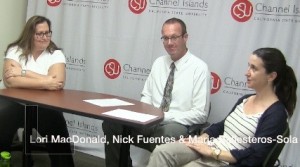CSUCI Faculty, Staff and Administrator School Experiences: Navigating Higher Education
Research Team
Sunghee Nam, PhD – Sociology
Elizabeth Sowers, PhD – Sociology
Kaia Tollefson, PhD – Education

Lori MacDonald, Nick Fuentes and Maria Ballesteros-Sola share their stories about how they got to college
How did you make it to college? (click to play)
Ms. Lori MacDonald, Coordinator of Student Recruitment Programming
Mr. Nick Fuentes, Director of Operations, Extended University
Ms. Maria Ballesteros-Sola, Faculty, MVS School of Business
Research Design
We interviewed CI employees — faculty, staff and administrators — who were first-generation college students themselves (24 participants) and who were not first-generation college students themselves (6 partipants). Eleven individual and six focus-group interviews were conducted, each of which took approximately 90 minutes. Our questions were categorized under the following headings:
- Understanding the Term, “first-generation college student” (FGCS)
- About the Parents of FGCS
- Participants’ Educational Aspirations and Experiences
- Participants’ Experiences as Faculty, Staff and Administrators in Higher Education
Understanding and Problematizing the Term “First Generation College Student”
- Our definition: a first-generation college student (FGCS) is a college student whose parents have no college education (neither parent attended college)
- While predictable patterns did emerge, we cannot assume that we know anything about individuals because of their FGCS/NonFGCS status
- We applied today’s literature and framework to study an identity category that didn’t exist when most research participants were in college
- First-gen experience 20-30+ years ago: in many cases, most peers were also first-gen
- Affordability of college 20-30+ years ago compares poorly to affordability of college for today’s FGCS
- Qualitative data captures a moment in time
- We identified patterns, not magnitude
What We Learned
- It’s complicated. We assumed that we would find a difference in the stories of FGCS and Non-FGCS among CI’s faculty, staff and administrative employees. We learned that the phrase “first generation college student” does not capture the full range of experience for either FGCS or NonFGCS. The following story is from a CI Non-FGCS respondent:
When I was old enough to attend preschool, my mother took on two additional jobs to afford for me to attend a private preschool. I continued at this school, which was preschool – 12th grades, until 4th grade, when we had to move due to financial reasons (my mother was offered a better paying job that would cover all expenses her previous 3 jobs barely met). However, I had to start attending public school, because there were no private schools in the area. During my 4th grade year, we moved 3 times, and I attended 3 different schools. This was due to the nature of my mother’s job. Also, because my parents divorced when I was 3, my mother was supporting me and my brother solely on her income. We were on welfare (food stamps) for a while.
- FGCS and NonFGCS participation in college activities was more similar than dissimilar.
- Still, the label is useful. As one interview participant said, “It helps focus the discussion.” But the label is limiting. We need to be cautious in making conclusions and decisions based on FGCS status alone.
We Discovered Some Patterns
- CI’s faculty, staff and administrators who were FGCS were more likely to work 40+ hours/week while going to college, at every level. Differences between FGCS/NonFGCS were less pronounced at 39 hours/week and less.
- FGCS reported:
- feeling less academically confident, less academically prepared and less informed about college
- less expectation from parents that they would earn a college degree
- their bachelor’s, master’s and doctorate degrees as means to improve their abilities to help others
- NonFGCS reported:
- more experiences talking about college and career with more categories of people
- parents played a significant role in college and career decision making
- many of the same experiences navigating college as FGCS